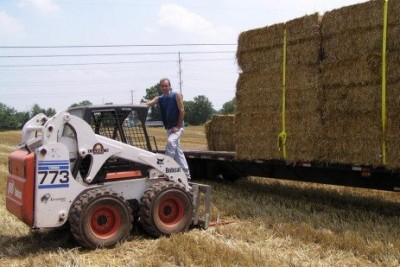Straw: To Bale or Not to Bale?

By Andrew Frankenfield; originally published https://extension.psu.edu/stra...
Wheat harvest has started in southern Pennsylvania and balers will be running closely behind the combines to get the straw baled and soybeans planted. With the spike in fertilizer prices this growing season, the nutrient value in the straw is higher than ever. A nutrient analysis would be ideal for your farm but book values for wheat straw are estimated at 11 pounds of N, 3 pounds of P2O5, and 20 pounds of K2O per ton of straw. Using values of N=$1.10/lb, P2O5=$1.07/lb, and K20=$0.75/lb, that equals $30/ton in total value of nutrients removed per ton of straw. Add on to that the baling and transportation cost, the value of the straw will likely exceed $75/ton as large square bales. Also, don't forget about the storage and hauling cost, you may be close to $100/ton breakeven.
If wheat straw is spread and not baled, each ton will return 11 pounds of N, 3 pounds of P2O5, and 20 pounds of K20. The nitrogen will not be immediately available for uptake, the P2O5 is not too significant, but the K20 certainly is. If two tons of straw is left on the field 40 pounds of K20 is returned to the field. At $0.75 per pound of K20 that is $30 per acre plus the organic value of the carbon going back on the field.
Another way to recover some of the K20 from the straw is to spread the straw out the back of the combine, allow it to rain on it, and leach some of the K20 from the straw into the soil then rake it up and bale it. Is that worth recovering some of the $15 per ton of K20? Not likely if you are planning to sell your straw, you will likely take a larger loss on your price per ton you receive, compared to the other farmer with bright yellow straw.
The take-home message is whether you bale your straw or not, make sure you have enough K20 for the next crop. Extension Educators have reported across the state it is not too uncommon to see K20 deficiencies in corn and soybeans.
Upcoming Events
Boots in the Barn: Cornell Dairy Research Updates
January 13, 2026
January 20, 2026
January 27, 2026
February 3, 2026
February 10, 2026
February 17, 2026
February 24, 2026
Join us for some or all!
Webinar: Converting Old Dairy Barns into swine Facilities
January 21, 2026 : Webinar: Converting Old Dairy Barns into swine Facilities
Tim Terry, Farm Strategic Planning Specialist with Cornell's Pro-Dairy program will share information on what it takes to transition an old dairy barn for swine production. We plan to cover flooring, ventilation, and lighting, considerations for system workability, and more! Registration is free.
Southern Tier Crop Congress
January 28, 2026 : Southern Tier Crop Congress
Belfast, NY
Join SWNYDLFC and CCE Allegany County for the upcoming Southern Tier Crop Congress. CCA and DEC credits are available!
Announcements
Cows, Crops & Critters Newsletter Sponsorship
TRYING TO REACH GROWERS AND AGRIBUSINESSES IN OUR SOUTHWEST REGION OF NEW YORK?Weekly Email Update: Shared with 625+ households who have signed up with our program.
Monthly Paper Mailer: To reach our stakeholders and farmers who lack internet access, we send out a monthly mailer where your company's logo and contact information would be featured with a mailing list of 330+ households.
If you sponsor our weekly and monthly publications you reach approximately 955 households.





